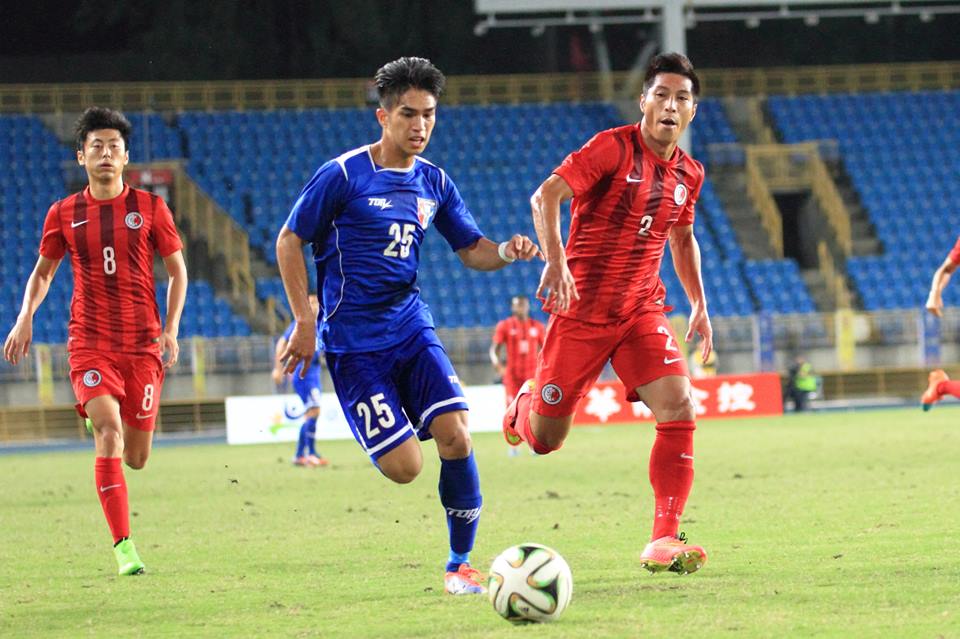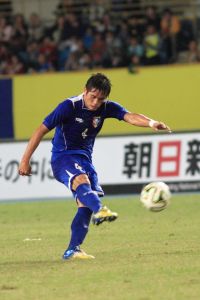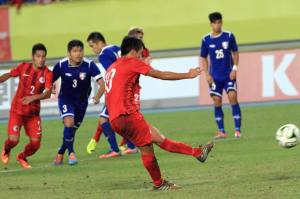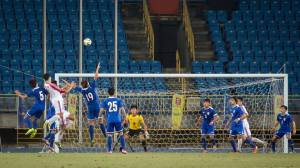North Korea have qualified for next summer’s EAFF East Asian Cup in Wuhan, China, following a recent round-robin tournament in Taipei, which promised litte but ended up delivering plenty.
The first round of matches were held on a filthy wet night, at the Taipei Municipal Stadium, which is more accustomed to hosting athletics meetings, and was reconstructed in 2009 to host the highly prestigious Summer Deaflympics. This inexperience told in the quality of the pitch, which under the burden of a torrential downpour and two back-to-back games was already cutting up before the second game was long underway.
Sadly for the neutral spectators, fate had decreed that the fixture likely to decide the outcome of the round was the first to be played, as favourites North Korea took on a plucky Hong Kong side looking to rebound positively from a 7-0 drubbing at the hands of World Cup Finalists Argentina in their previous game.
With just 800 fans rattling around the 20,000 all-seater stadium, despite tickets being free, a drab, weather affected first half which saw neither side wanting to give anything away, made way for an exciting final half hour after Ri Chol-myong gave North Korea the lead on the hour mark.
Forced to come out and seek an equaliser, Hong Kong pressed hard, but fell victim to a sucker punch as O Hyok-chol scored a second for the North Koreans on 80 minutes. Hong Kong kept their heads up, and had a lifeline just three minutes later when Jaimes McKee of Sun Pegasus in the Hong Kong league, pulled one back.
It was the first goal Hong Kong had registered against North Korea in a competitive fixture for more than 25 years, but it wasn’t enough as a late chance for Kitchee’s Xu Deshuai was hit tamely at the keeper.
Hong Kong’s coach, Kim Pan-gon was disappointed but pragmatic at the end”We came back from two goals down but the players were never discouraged and kept fighting till the end. We could have scored an equaliser with a little luck but the boys gave it everything they had. Considering we lost 4-0 at home in our last qualifying tournament against the North Koreans, it is an improvement.”
“Considering we lost 4-0 at home in our last qualifying tournament against the North Koreans, it is an improvement!” Hong Kong coach Kim Pan-gon in pragmatic mood.
Next up was the hosts, Chinese Taipei, getting their campaign underway against the winners of the First Preliminary Round, Guam. With the crowd swelled slightly, but still only 2,405, hopes were nevertheless high amongst the home faithful of starting their home campaign with a win.
But the fact remained that Guam, despite having a fraction of the population of Taiwan, were still ranked higher than the inexperienced Chinese Taipei team, and won the last fixture between these sides 3-0 back in 2013.
Despite the home side coming out all guns blazing, a professional first half performance from Guam saw them soak up the pressure and make the most of what chances they created.
They took the lead in the 14th minute with Jason Cunliffe converting from the penalty spot, and it nearly went from bad to worse for the hosts in the 26th minute with defender Chen Yi-wei scrambling a fantastic chance from Guam to double their lead off the line.
Whilst the home side kept the ball well from then on, they toiled in front of goal without any success, and were punished for their lack of ruthlessness in front of goal, when pacy Guam winger Shane Malcolm broke clear just before the break and doubled Guam’s lead by calming lifting the ball over the onrushing keeper.
A shell-shocked Chinese Taipei came out swinging after half time, knowing that they had to make inroads if they were to get the result they desperately needed. Both sides played some neat football with Chinese Taipei passing the ball well and dominating possession. And they were rewarded in the 56th minute when Chen Hao-wei, of Chinese League One side Beijing Baxy halved the deficit, with a cool finish under the keeper.
With their lead under threat, Guam sat back even more and invited Chinese Taipei onto them, whilst counterattacking with pace and power, particularly down Chinese Taipei’s exposed flanks. They were almost caught again a few minutes later with Chinese Taipei seeing a strong penalty appeal waved away.
Both sides created chances, but neither were able to find that crucial goal. Hao-wei, buoyed by his first goal for his country, found himself clean through on two occasions, but first lifted a delicate lob wide of goal when faced with an onrushing keeper, before taking a golden chance on the left hand side of the penalty box with the wrong foot, after a corner kick led to chaos in the box.
But it wasn’t to be for Chinese Taipei, and a tired-looking Guam held on for another famous victory, in what was proving to be a memorable qualifying campaign for them.
A deflated Chinese Taipei were side were left to rue their missed chances and inability to make their dominance pay, and look ahead to two really tough fixtures, with their hopes of qualification already realistically over.
The second round of games took place four days later, on a pitch that had been hastily patched up. For a bright Sunday afternoon fixture, it was a very disappointing crowd of 657 who turned up to see the winners of the two first round games go head to head.
It was a feisty encounter with both sides committed in the tackle, but lacking that little bit of extra quality to make a difference for the first 70 minutes.
North Korea took the lead in the 14th minute, with a goal from Jong Il-gwan, but it was a lead that flattered them, and despite plugging away they never really looked like adding to it as Guam more than held their own. Their endeavours paid dividends in the 61st minute, and it was Jason Cunliffe again who was at the end of a fast break to capitalise on a fumble from a regulation take by the North Korean keeper to tap the equaliser into an empty net.
This goal finally snapped the North Korean team into life and they regained the lead just ten minutes with Il-gwan getting his second of the game.
From here on out they were determined to not to make the same mistakes and the Guam team looked deflated, as if knowing that their chances of a result had all but gone.
The North Koreans added a third in the 85th minute through Ri Sang-chol, and two more strikes in added time from Sang-chol and Kye Song-hyok gave the final score an imbalanced and unjustified look as the North Koreans ran out 5-1 winners.
These two victories left the North Koreans on the brink of qualification with a game to spare and meant Hong Kong had to get a result against Chinese Taipei to stand any chance of overtaking them.
This game was a passionate affair with the largest crowd of the round, 8,860, taking their places to watch the game unfold.
The match was proceeded by a very vocally supported protest in support of the democracy protestors on the streets in Hong Kong, an issue close to the heart of both sets of fans.
With yellow umbrellas put away, the crowd settled down to watch the home side toil valiantly to upset the odds.
But with the crowd roaring them on, they successfully took the game to their more fancied opponents. As early as the sixth minute, they created a great chance when midfielder Chen Hao-wei crossed from the right and found Turkish-Taiwanese striker Onur Dogan (also known as Chu En-le) unmarked in the box. Unfortunately he couldn’t manage to get a clean shot away.
Chinese Taipei ran the midfield throughout the 90 minutes with Shanghai Shenhua fringe player Chen Po-liang at the heart of everything good they were created. It was his long range effort in the 17th minute that forced a sharp save out of the busy Hong Kong keeper, Yapp Hung-fai.
“We have difficulty accepting the penalty, but in the end we have to accept the referees decision” Chinese Taipai coach Chen Kuei-jen was refreshingly magnanimous despite a controversial refereeing call.
And it was Po-liang again in the 25th minute who weaved his way past two Hong Kong defenders, and look set to unleash a shot before a desperate sliding tackle took the ball off his toe.
Hong Kong soaked up the pressure without ever really looking like creating their own chances, but there were a few glimmers towards the end of the half as Chinese Taipei tired, and it was Jaimes McKee again who worked the keeper.
It was shortly into the second half that the games defining moment occurred, with McKee breaking into the right hand side of the Chinese Taipei box and going down under the challenge of outrushing keeper Chiu Yu-hung. The keeper and his team were adamant he had played the ball first, but their protests were to no avail and Kitchee midfielder Lam Kai-wai kept his cool to send the keeper the wrong way from the spot.
To their credit, Chinese Taipei didn’t let this setback get to them and redoubled their efforts, creating several good opportunities as the game went on. Wen Chih-hao drove a good chance past the post from just outside the box and while Dogun did manage to get the ball in the net in the 86th minute for what would have been a deserved equaliser, the whistle had already gone for the ball going out of play
At the final whistle, the Chinese Taipei coach, Chen Kuei-jen rushed onto the pitch and confronted the referee over the penalty decision. His protests lasted a good five minutes, but needless to say were to no avail and in his post-match interviews he was as magnanimous as could be expected saying:
“It was a very disappointing defeat. Our goalkeeper had gotten to the ball cleanly, then the Hong Kong player spilled on top of him. We have difficulty accepting the penalty … but in the end we have to respect the referee’s decision.”
So the final set of fixtures kicked off with North Korea all but assured of top spot, and Chinese Taipei already playing for pride.
But the first game was between tournament surprise package Guam and Hong Kong, who still had an outside chance of qualification if they won.
But the game itself was a flat affair with Guam sitting back and looking to hit Hong Kong on the break. Hong Kong meanwhile struggled to create any meaningful chances in the first half.
There were headed chances either side of half time for the Ghanaian born Hong Kong midfielder Wisdom Fofo, of Chinese League One side Harbin Yiteng, and McKee again, but neither could capitalise.
As the game wore on, Hong Kong began to up the tempo and created more opportunities, with McKee and Wong Wai both wasteful. Guam also found more space in their opponents final third, but again couldn’t capitalise, and the outcome was a 0-0 draw which secured North Korea’s qualification before they even took the pitch for their final game.
The gulf in class between Chinese Taipei and North Korea was clear in the opening exchanges, but playing for pride, Chinese Taiwan gave a gritty and determined performance. The first proper North Korean chance wasn’t until the 18th minute and led to a fine acrobatic stop from keeper Chui Yu-hung.
The visitors did find the net just before half time as Jin Hyok-ri executed a perfect 25 yard lob only see his effort ruled out for offside.
Into the second half and Chol Min-rim was guilty of missing an open goal before Il Gwan-jong once again had the ball in the net for North Korea only for the linesman’s flag to deny them.
But Chinese Taipei again dug in and repelled everything the visitors had to offer. At the final whistle, the second successive 0-0 draw of the night was celebrated by the hosts as if they had qualified for the final round.
Certainly Chinese Taipei left the pitch with their pride restored and with something to build on in future months, but it is the North Koreans, who will, as many predicted before this round kicked off, join their bitter southern rivals, Japan, and the hosts China in the final round of the East Asia Cup in Wuhan next August.
In terms of results, there was little in this round of fixtures to turn heads. It was the performances of Guam, with a very respectable four points, which offers hope for the smaller nations this time round, whilst Chinese Taipei’s performances deserved more than their final points total suggests.
With a potent striker, they just might cause one or two shocks of their own next time round, as a young squad gains experience and maturity.
But the fact remains that until this tournament is reconfigured to give the smaller nations the chance to make a name for themselves against the big sides, the status quo which has been restated in Taiwan during this Second Preliminary Round, is likely to continue unchecked.



